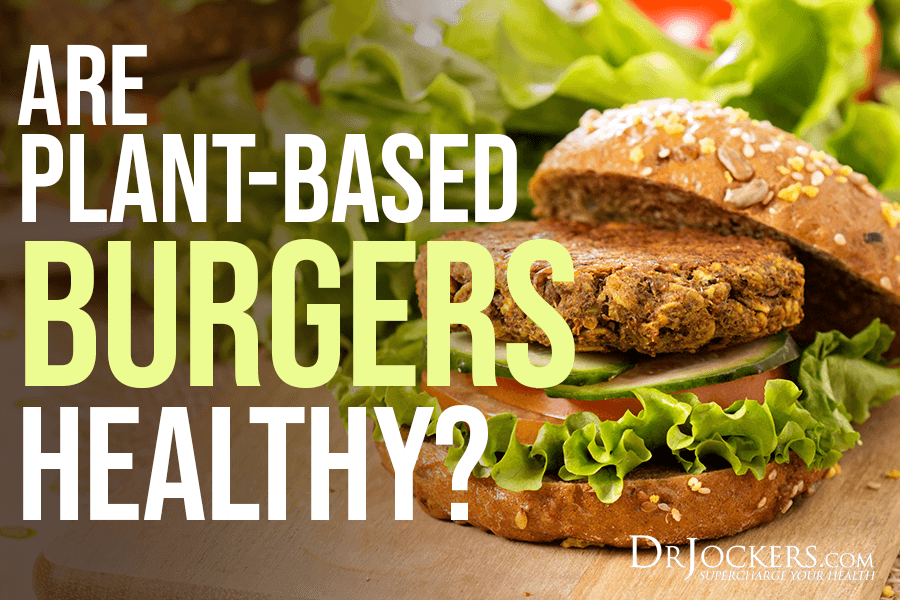 Are Plant-Based Burgers Healthy?
Are Plant-Based Burgers Healthy?
There is one thing I never buy at the grocery store. It’s plant-based burgers. You may be surprised to hear this. Aren’t plant-based burgers healthy?
Plant-based burgers have been around for decades to offer alternatives for vegans and vegetarians. As you may know, I don’t recommend following a vegan or vegetarian diet. Most vegan and vegetarian diets are very high in gluten, grains, soy, and legumes which can increase inflammation and health issues. You may also miss a lot of crucial nutrients from high-quality animal protein.
However, in recent years, plant-based burgers and other plant-based meat alternatives have become ever increasingly popular even beyond vegan and vegetarian circles. With the rise of Beyond Meat and Impossible Burger, there are more plant-based burgers and meat alternative options than ever. Even more restaurants and fast food chains offer plant-based burgers and meat alternative options.
Now don’t get me wrong. I’m all about healthier options. I love seeing more nutrient-dense gluten-free options and bunless burgers at restaurants. I’m all for eating more healthy whole foods.
The problem is that plant-based burgers are not actually healthy. Advertisers are telling us that they are good for our bodies and our environment. But if you look at the ingredient list, you will quickly realize it’s not the case. Plant-based burgers and other plant-based meat alternative options are overly processed foods full of additives and artificial ingredients that are incredibly inflammatory. You may think that you are doing yourself a favor by choosing plant-based burgers, but you are actually feeding inflammation and increasing the risk of health issues.
In this article, I want to discuss the problems with plant-based burgers. You will learn what plant-based burgers are. I will go over the most common plant-based burger brands and their common ingredients. I will discuss whether plant-based burgers are nutritious or not. You will learn about the five top reasons to avoid plant-based burgers. You will understand why real food is better than fake food. I will discuss why a grass-fed burger is the best way to go when you are craving hamburgers. Finally, I will touch on the subject of regenerative agriculture for a healthy environment.
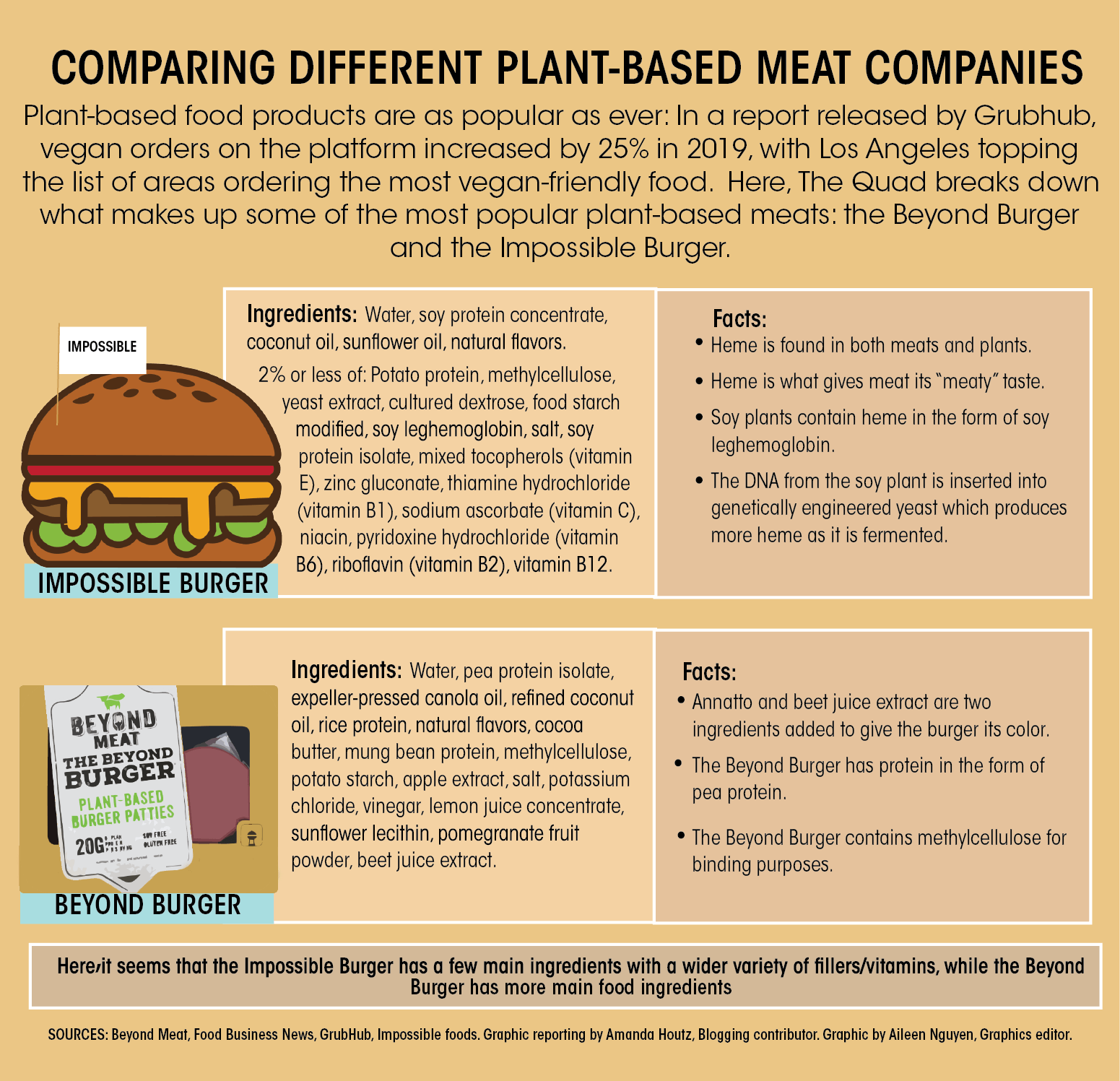
What are Plant-Based Burgers?
Plant-based burgers are hamburgers that are not made from beef or other animal products. Instead, plant-based burgers are made from protein from legumes, such as soybeans, beans, or lentils, vegetable proteins, such as pea protein, grains, such as quinoa or wheat, and vital wheat gluten, also known as seitan.
Plant-based burgers are obviously popular among vegans and vegetarians. Some plant-based burgers are completely vegan and include no animal products. Some plant-based burgers contain dairy products and are vegetarian but not vegan.
However, in recent years, plant-based burgers have become popular among those who are not vegan or vegetarian. Plant-based burgers are advertised as a healthy alternative to real meat burgers and animal protein. But are they healthy? In the next sections, you will learn more about plant-based burgers and why they are not as healthy as you’ve been told.
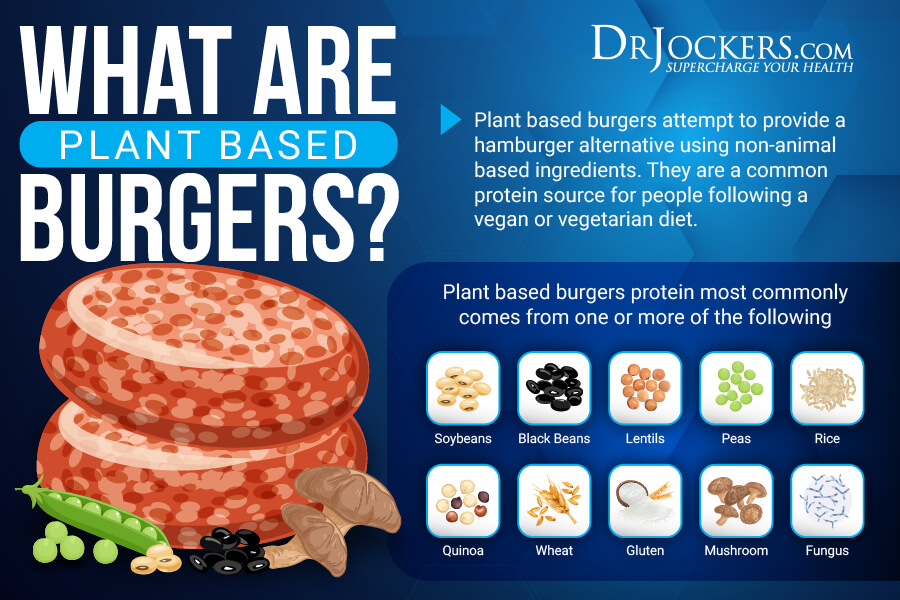
Most Common Brands of Plant-Based Burgers
The most common brands of plant-based burgers include Beyond Meat, Impossible Burgers, Quorn Foods, Morningstar Farms, and Boca Foods. The main ingredient in Beyond Meat burgers is pea protein isolate. It’s a type of protein that is made by isolating protein from peas by stripping and processing the nutrient.
The main ingredient of Impossible Burger is a soy protein concentrate made from processed soy. The main ingredient of Quorn Foods burger is mycoprotein, a protein made from Fusarium venenatum, a naturally occurring fungus. The main ingredient of Morningstar Farm and Boca Foods burgers is soy protein concentrate.
These ingredients are not only chemically processed but can also increase food allergies and food sensitivities. According to a 2021 study published in Trends in Food Science & Technology, pea protein can lead to pea allergies (1). According to a 2019 study published in Foods, depending on the preparation, soy protein and soy products can cause severe allergic reactions (2). A 2002 study published in the Journal of Clinical Pathology, mycoprotein may lead to allergic reactions (3).
Beyond these main ingredients, plant-based burgers also include some other unhealthy ingredients. Canola oil, sunflower oil, and other refined oils are common ingredients in plant-based burgers. These are refined oils that go through refinement, processing, and chemical treatment. They may come from genetically modified ingredients. According to a 2018 study published in Open Heart, refined vegetable oils may increase the risk of inflammation and heart disease (4).
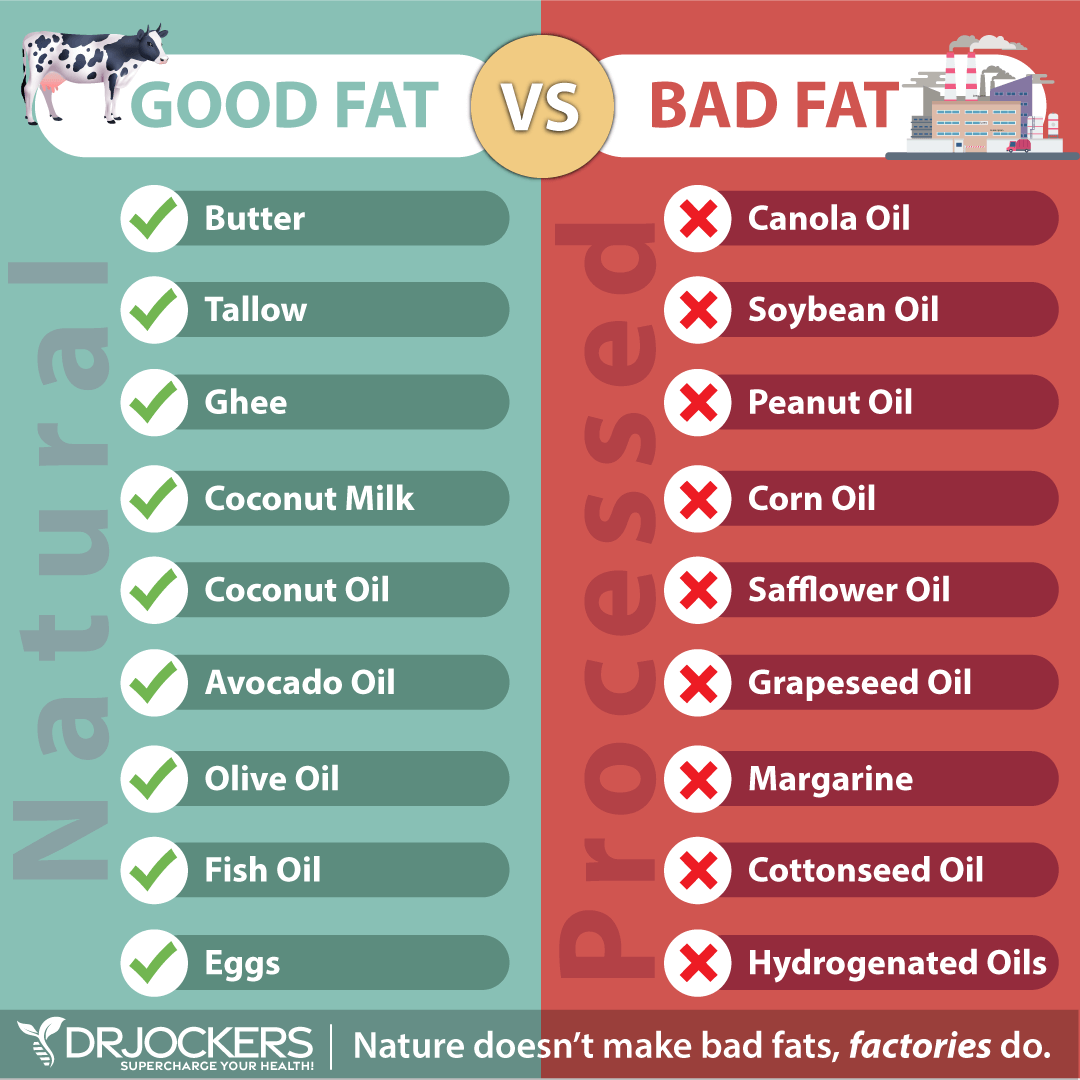
They generally include MSG. A 2019 review published in Comprehensive Review in Food Science and Food Safety has found that MSG may be linked to “cardiotoxicity, hepatotoxicity, neurotoxicity, low-grade inflammation, metabolic disarray, and premalignant alterations, along with behavioral changes” (5).
Maltodextrin is a thickener, filler, and preservative often used in plant-based burgers and other processed foods. According to a 2016 review published in Critical Reviews in Food Science and Nutrition, maltodextrin may increase the glycemic load (6). It may increase the risk of insulin spikes and digestive issues.
Many plant-based burgers, including Morningstar and Boca, also include wheat gluten, whole-grain oats, and other grains. Gluten and grains can increase the risk of inflammation, leaky gut syndrome, digestive issues, autoimmune disease, and other health issues. According to a 2020 study published in Nutrients, a gluten-free diet may improve gut microbiome and gut health (7).
Moreover, plant-based burgers may also contain conventional dairy, which can also increase food sensitivities and digestive issues. According to a 2019 review published in Nutrients, cow’s milk is among the most common food allergens and food sensitivities (8).
Natural flavors are another common ingredient. Despite the name natural, the natural flavor doesn’t mean it’s natural. Natural flavors come from essential oil, oleoresin, essence or extractive, protein hydrolysate, distillate, or other ingredients made with heating, roasting, or enzymolysis to derive flavors from vegetable juices, fruit juice, spices, herbs, meat, poultry, eggs, dairy, or other food items. According to a 2020 review published in NPJ Science of Food, natural flavors may have toxic effects (9).
Other unhealthy, processed additives and ingredients may include gum arabic, succinic acid, acetic acid, methylcellulose, modified food starch, potato starch, xanthan gum, glutamic acids, and artificial colors. The list goes on. And no matter what packaged plant-based burger we look at, we will find unhealthy and inflammatory ingredients within these overly-processed foods.
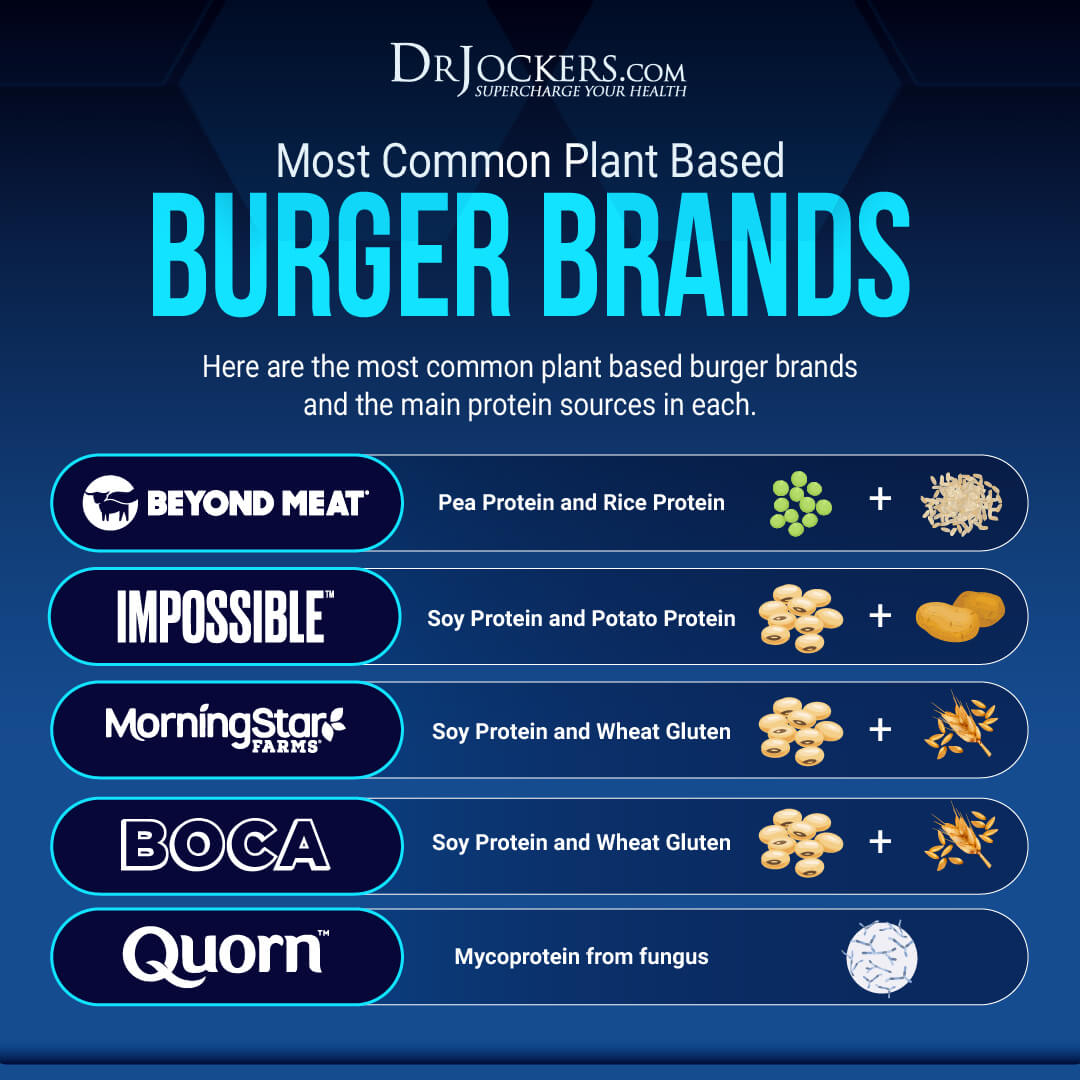
Are These Plant-Based Burgers Nutritious?
Many people claim that plant-based burgers are nutritious and healthy. But are they? Let’s look at it.
Looking at the calorie content, plant-based burgers are only slightly lower in calories. Plant-based burgers are around 250 calories per burger and beef burgers are around 290 calories. Burgers made from lean beef are actually lower in calories, around 200 calories. If eating too many calories is your main worry, you are not winning by choosing plant-based.
Nutrients are more important than calories, though. The macronutrient contents are very similar. The difference comes from the ingredients. The protein in plant-based burgers comes from soy protein, pea protein, other legumes, and grains. These can be very hard on your stomach and increase digestive issues, inflammation, and other health issues.
Hamburgers made from real ground beef are high in iron, B vitamins, zinc, and selenium. Most plant-based proteins are usually lacking or are low in these micronutrients. Beyond Meat burgers contain iron. However, it’s non-heme iron, which is less bioavailable than heme iron from meat. Impossible Burger is rich in B vitamins. However, they come from synthetic B vitamins added during processing. They are less bioavailable than natural B vitamins in beef burgers.
All and all, plant-based burgers are highly processed and much lower in bioavailable nutrients than grass-fed beef burgers. If you must eat a plant-based burger, making a homemade lentil or quinoa burger is a much better option than packaged plant-based burgers. However, homemade lentils, quinoa, and other plant-based burgers are still lower in nutrients, lower in protein and can be hard on your digestion.
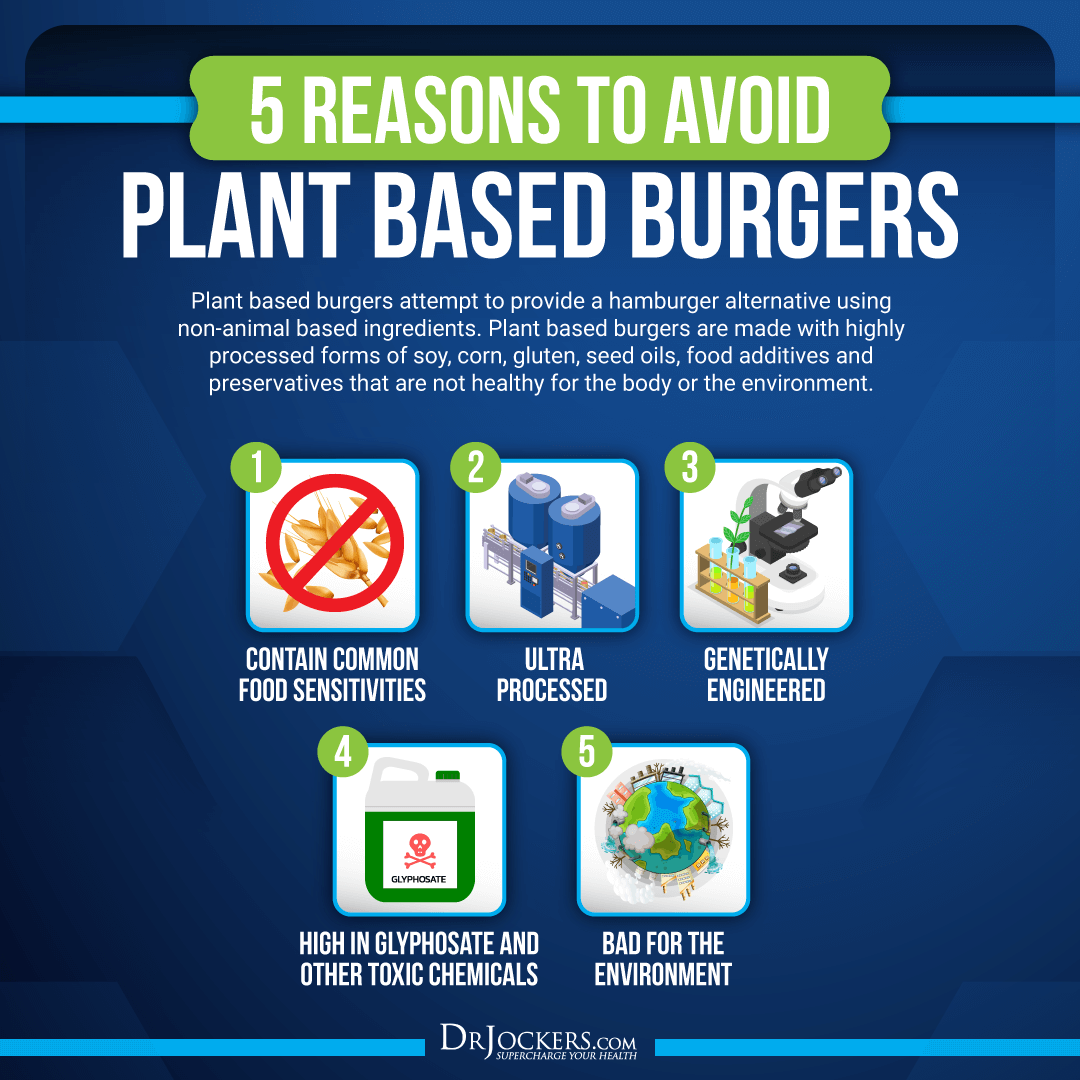
5 Reasons to Avoid Plant-Based Burgers
You may already be convinced that you need to avoid plant-based burgers. But if you still have doubts, I want to share the top 5 reasons to avoid plant-based burgers.
Contains Common Food Sensitivities
Plant-based burgers are loaded with the most common food allergens and triggers of food sensitivities. Most of them include soy, corn, gluten, food additives, and preservatives.
(1, 2, 3, 7, 8). Some include all these items, but all contain at least some of them. These common food sensitivities can cause chronic inflammation and symptoms over time. Even if you don’t react to the plant-based burger right away, you may experience symptoms some hours or even days later.
If you eat plant-based burgers regularly, you can experience chronic symptoms without realizing the culprit. Common symptoms of food sensitivities include headaches, migraines, digestive issues, muscle aches, joint pain, fatigue, poor sleep, brain fog, poor memory, and more.
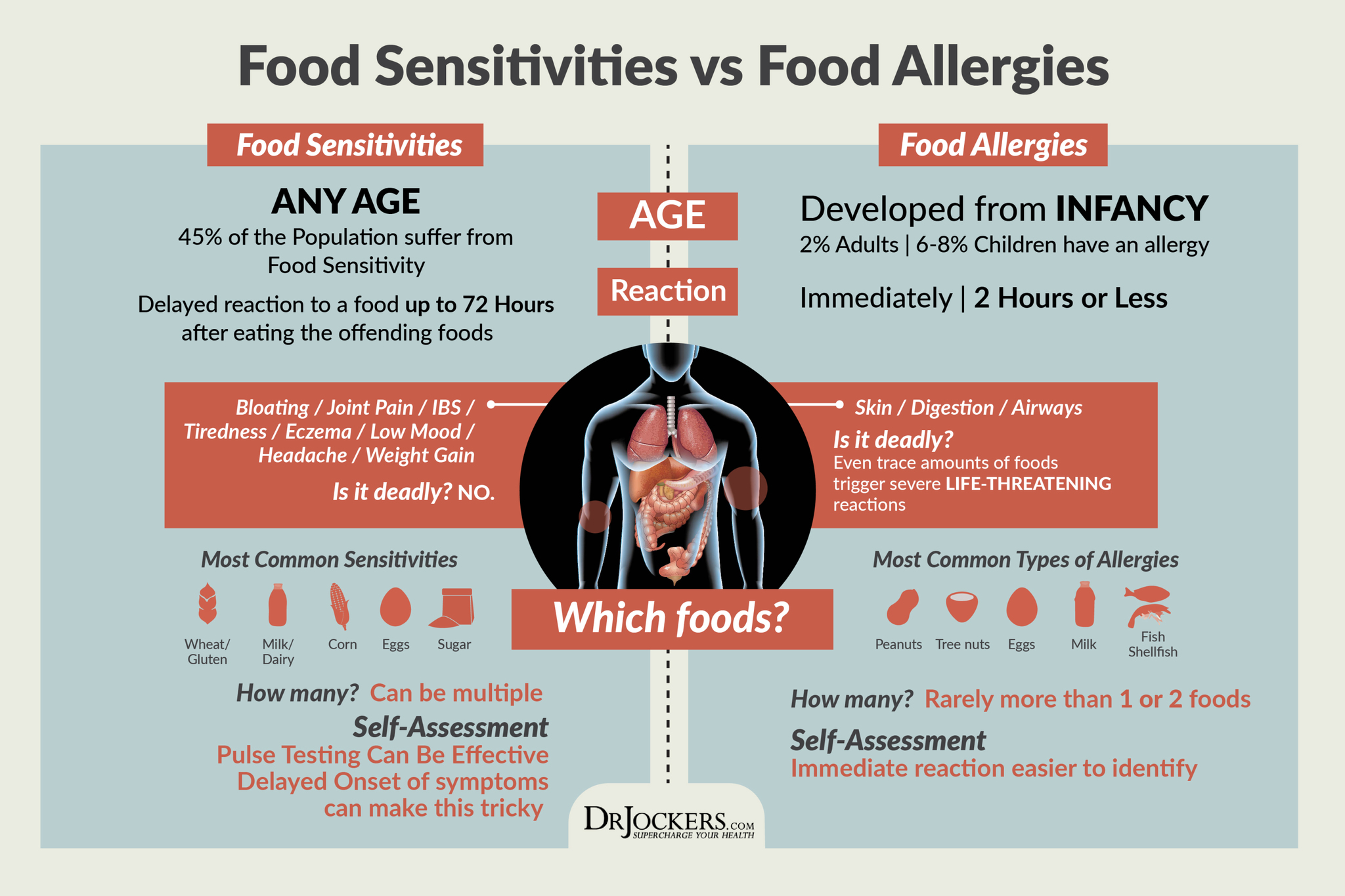
Ultra Processed
Plant-based burgers are ultra-processed. This means that they are not whole foods. Pea protein isolate in Beyond Meat burger is actually made by stripping away and processing nutrients from peas. Soy protein concentrate in Impossible Burgers is another protein that has gone through serious processing (2).
Your body cannot recognize ultra-processed food-like products. It cannot properly use all the processed ingredients, including soy protein concentrate, pea protein isolate, canola oil, dextrose, synthetic vitamins, and potassium chloride. While whole foods are rich in bioavailable nutrients that nourish your body, overly processed foods full of processed ingredients and chemicals are difficult to digest and get nutrients from.
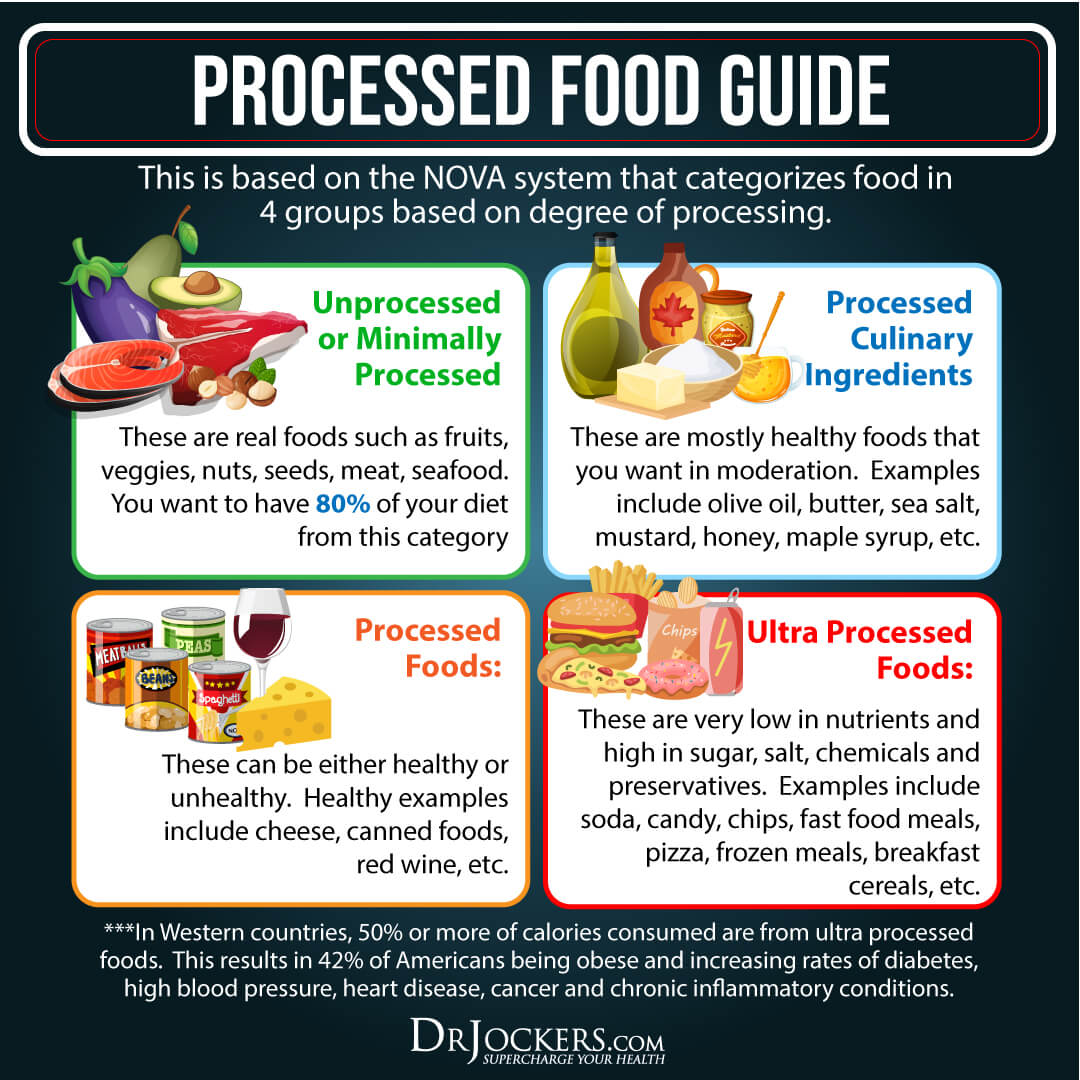
Genetically Engineered
Plant-based burgers commonly include genetically modified ingredients. Plant-based burgers often use genetically modified soy, corn, or other foods as their ingredients. Plant-based burgers that contain iron, use genetically modified soy with heme iron added to it through processing or create heme through the fermentation process of genetically engineered yeast.
Beyond Meat claims, they don’t use GMO ingredients. However, their main competitor, Impossible Burger, proudly included several GMO ingredients (10).
Needless to say, GMO ingredients are not natural for our bodies and are not the best for our health. A 2009 review published in Critical Reviews in Food Science and Nutrition has found that GMO foods may cause toxic effects, including reproductive, pancreatic, renal, hepatic, and immunologic problems (11).

High in Glyphosate
Many plant-based burgers are not 100 percent organic or not organic at all. This means that they may be high in herbicides and pesticides. Beyond Burger, for example, has tested incredibly high for glyphosate, a non-selective herbicide that can kill most plants and harm your body (12).
According to a 2012 study published in Currents in Microbiology, glyphosate may alter your microbiome imbalance (13). It may increase the risk of chronic inflammation, digestive issues, hormonal issues, and according to a 2014 study published in Environmental Sciences Europe, even organ damage (14).

Bad for the Environment
Many tout plant-based burgers as something good for our environment. If you look at it closely, it is not the case. Manufacturers of plant-based burgers use monocropped agriculture. Monocropped agriculture used a single crop each year on the same land without rotating crops or growing multiple crops in the same area. This strategy is most commonly used for growing corn, wheat and soybeans.
This is not a natural way to grow food. In nature, different crops grow and work together. Traditionally, farmers used to rotate their crops to support soil and nutrient-dense food growth. Monocropping, on the other hand, can weaken the soil, reduce nutrients from your food, and reduce taste. Not only that, but through monocropping, we have also lost much of our healthy land, monocropping brings up an array of issues.
To tackle problems, farmers on these monocropping lands increasingly rely on the use of pesticides, herbicides, and unnatural fertilizers. The use of GMOs is also more common on these farms. Of course, the combination of weak soil, low nutrient content, herbicides, pesticides, fertilizers, and GMOs create foods that are far from ideal and actually harmful to your health (14).
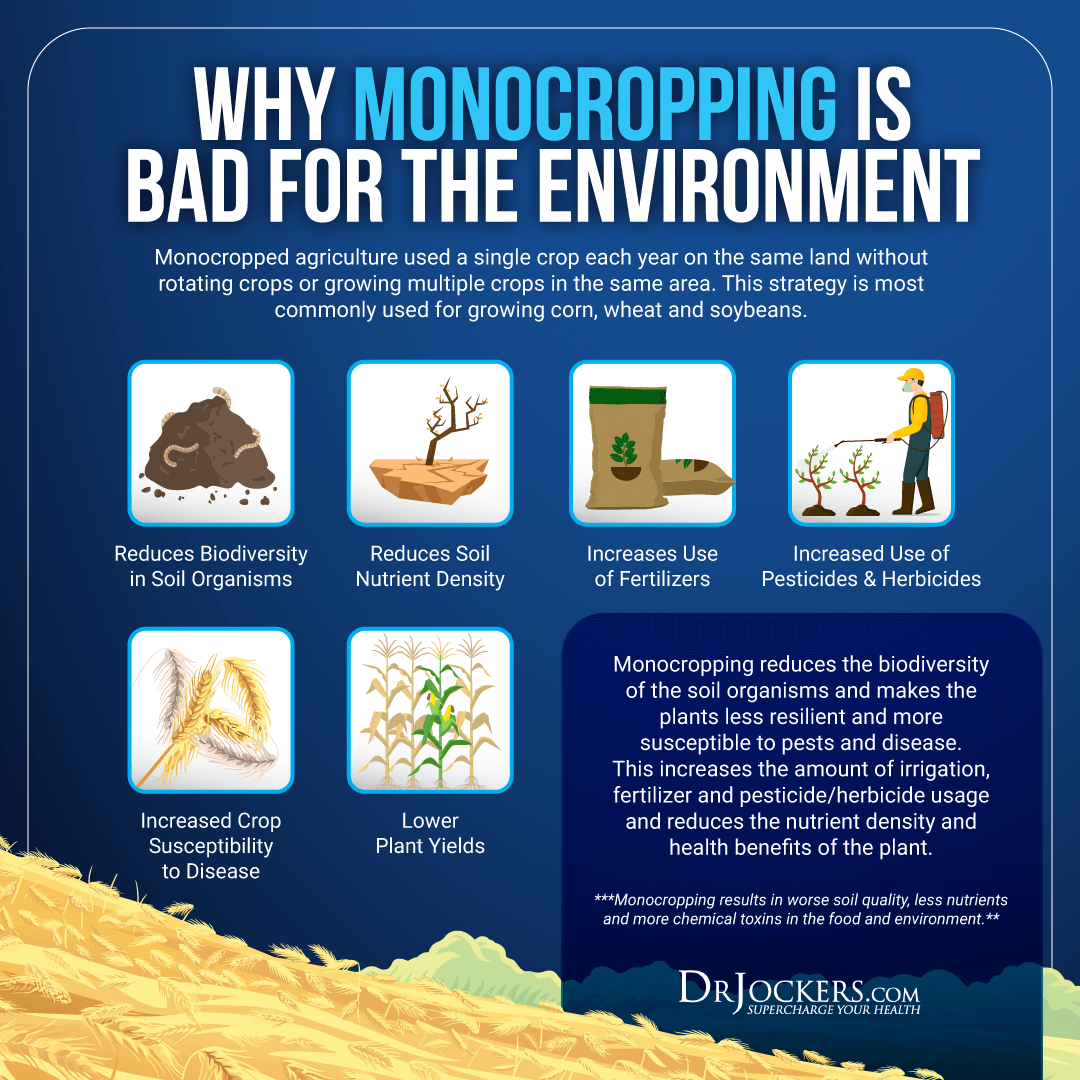
Real Food is Better Than Fake Food
Before I get into the benefits of real food vs fake food, let’s define the food. Real foods are whole foods. They are not overly processed. They are free from additives, artificial ingredients, pesticides, herbicides, hormones, and other unhealthy junk. They are rich in nutrients and nourish your body.
They are grown in healthy soil or come from healthy animal sources. Real foods include organic greens, vegetables, herbs, spices, foods, fermented foods, grass-fed meat, pasture-raised poultry and eggs, wild-caught fish and seafood, and wild game.
By fake food, I refer to overly-processed, unhealthy food-like items. They are full of additives, artificial ingredients, and other unhealthy ingredients. They may be high in or contaminated with pesticides, herbicides, and hormones. If they include vitamins or minerals, they are often synthetic and added later. They have a long shelf-life, which gives you a clue that they are not real. Real whole foods should break down over time and shouldn’t stay the same in your pantry for 5 or 10 years.
Real, whole foods are loaded with nutrients and support your health. Fake, overly-processed foods can increase inflammation, gut health issues, chronic symptoms, and chronic health issues. If you want to learn more about the benefits of eating real foods over fake food, I recommend reading this article on real food keto vs dirty keto.
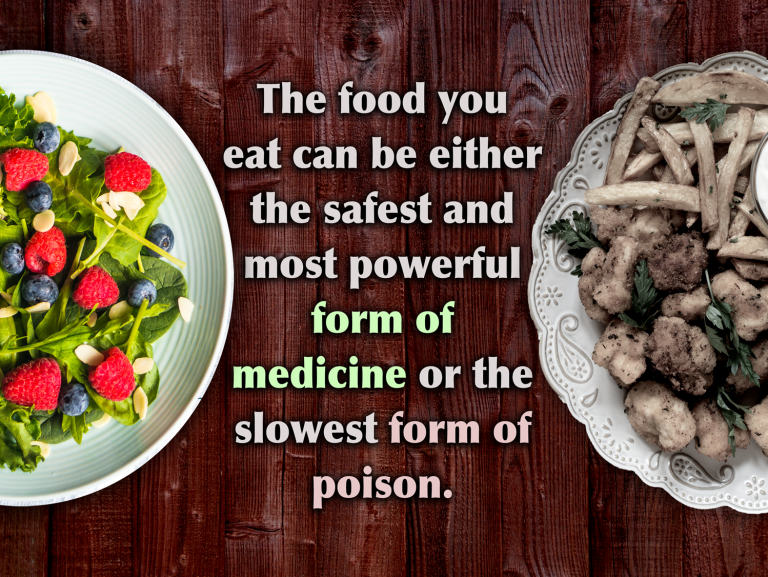
Why Grass-Fed Meat is The Way to Go
By now, it’s probably clear to you that I recommend burgers made from meat over plant-based burgers. But not all meat burgers are created equal either. It’s important to choose wisely.
Burgers from conventional meat are generally lower in nutrients and don’t taste as good either. The animals are often treated with hormones and/or antibiotics that can contaminate your burger and affect your health. They are fed corn and/or grains that are usually genetically modified and treated with pesticides and herbicides. If the cows are not given healthy food, their meat won’t be of the best quality either. The pesticides and herbicides they consume and antibiotics or hormones they are given may harm your health.
Naturally, cows eat a nearly 100% green diet of grass, flowers, shrubs, and other wild vegetation, not on grains and corn. Grass-fed animals are fed just like that, according to their natural diets and needs. Grass-fed mammals are also extremely rich in carnitine and carnosine.
Carnitine helps cellular mitochondria drive energy efficiently from fat metabolism. Carnitine is the critical gatekeeper that allows fatty acids to pass into the mitochondrial furnace effectively (16). Carnosine is a powerful antioxidant that improves muscle, brain & cardiovascular function. It functions to reduce the effects of stress and aging by protecting the proteins of the body which aids in tissue healing and repair (17). Grass-fed beef is also rich in zinc, vitamin D, vitamin E, omega-3 fatty acids, conjugated linoleic acid (CLA), and creatine.
To learn more about the benefits of grass-fed meat, I recommend reading this article. In this article, you will also learn why grass-fed beef is superior to poultry.
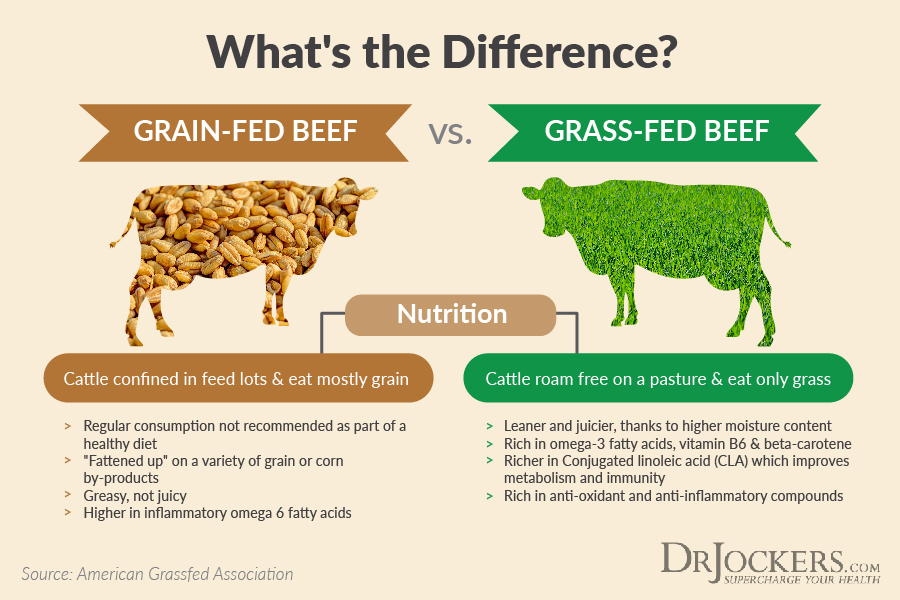
Where to Get the Best High Quality Meat Products
I get my grass-fed and grass-finished beef from Wild Pastures which provides the highest quality meat products from farmers who take great care of their land and their animals. By partnering with a network of small, local farms across the country and buying in bulk, (absolutely no imported meat or factory farms!), they are able to charge less than competitors – while offering higher quality, fresher meat.
Here are the reasons why I LOVE using Wild Pastures
- High-Quality Meat: Delicious 100% grass-fed beef, pasture-raised chicken, heritage-breed pork, and wild-caught seafood.
- Unbeatable Value: Average cost = Less than $7 per meal.
- Flexibility: Box options and delivery frequencies to fit your needs, cancel any time with no penalty.
- Convenience: Great-tasting, high-quality meat you can feel good about, delivered right to your doorstep (FREE shipping).
- Decisions That Make a Difference: Wild Pastures cares about animals and our planet, improving livelihoods for farmers and better meals enjoyed together.
How Wild Pastures Works:
- Wild Pastures sources from farmers and fishermen who meet the highest standards for quality.
- You choose your box and delivery frequency. They offer curated and customized boxes, so you get exactly what you and your family love.
- Wild Pastures ships your order, frozen at the peak freshness and packed in an eco-friendly, 100% recyclable box.
- You enjoy high-quality meat delivered to your door and more time for amazing meals together.
If you sign up for Wild Pastures today, you can get $100 off (($20 OFF your first 5 boxes!)
Regenerative Agriculture for a Healthy Environment
The last thing I want to touch on is the importance of supporting a healthy environment. Manufacturers of plant-based burgers and even conventional meat support monocropping. Farmers of grass-fed meat support regenerative agriculture for healthy environments.
Regenerative agriculture refers to farming and grazing practices that help to rebuild soil quality, restore degraded soil diversity, and reverse the effects of climate change. It’s a holistic and dynamic approach to farming. It uses organic farming and permaculture principles.
Methods used in regenerative agriculture include covering crops, crop rotation, composting, conservation tillage, pasture cropping, mobile animal shelters, and feeding animals on their natural food through grazing practices. Regenerative farming increases food production, which can improve the farmers’ income.
Regenerative agriculture practices create high-quality, nutrient-dense foods. Buying high-quality grass-fed meat for your burgers not only supports your body but also supports regenerative agriculture and the environment. It’s a win-win for all.
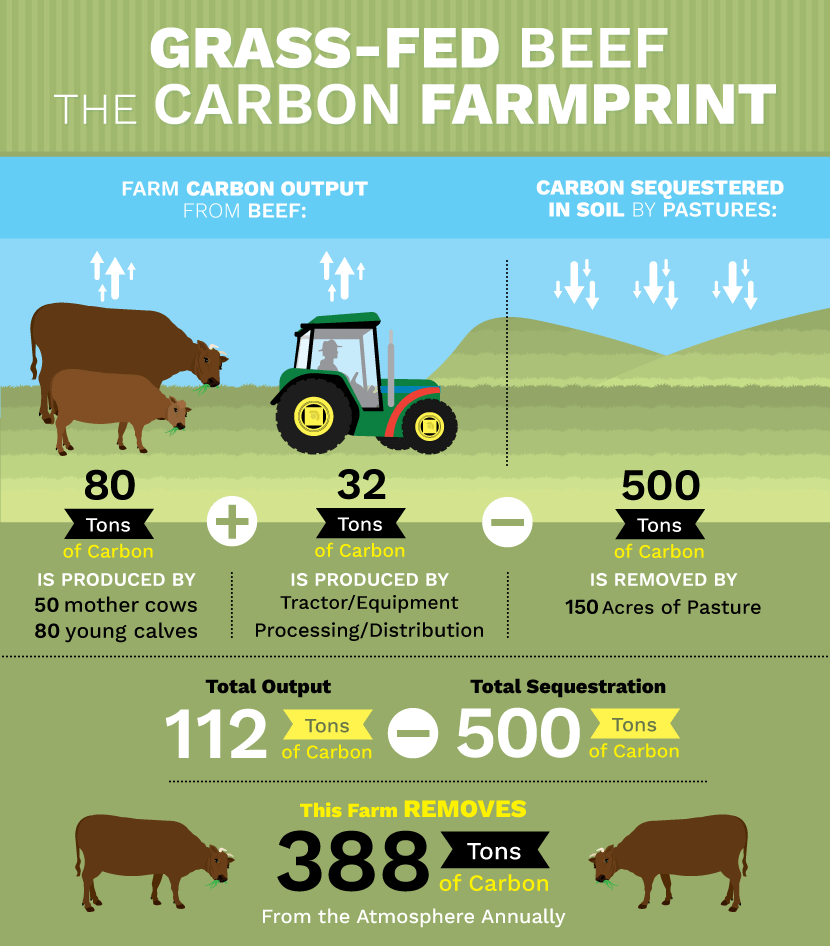
Final Thoughts
Plant-based burgers have gained increased popularity in recent years, even among those who are not vegans or vegetarians. Unfortunately, plant-based burgers are not as healthy as they are advertised. Reading this article, you now understand the potential issues with plant-based burgers and the importance of consuming grass-fed meat burgers instead. I recommend that you choose high-quality grass-fed meat for your burgers and other meat to support your health, regenerative agriculture, and our environment.
If you want to work with a functional health coach, I recommend this article with tips on how to find a great coach. On our website, we offer long-distance functional health coaching programs. For further support with your health goals, just reach out and our fantastic coaches are here to support your journey.

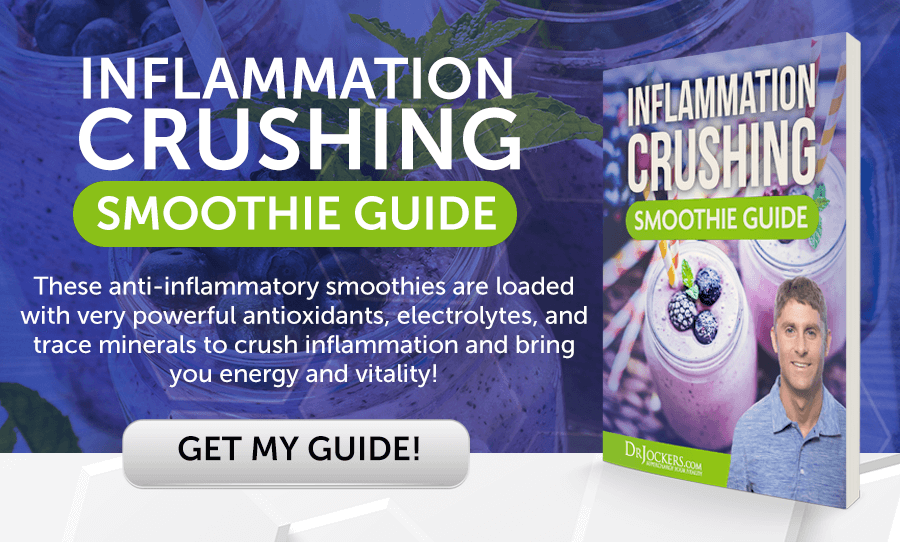


Wow—what an informative article on plant based burgers. However, I love God’s creatures and will not eat them. I have chronic fatigue so it is hard to make my own burgers and such. I like Beyond Burgers for the protein content. I am a vegetarian and track everything I eat.
Any suggestions for a company that makes wholesome and filling meals?